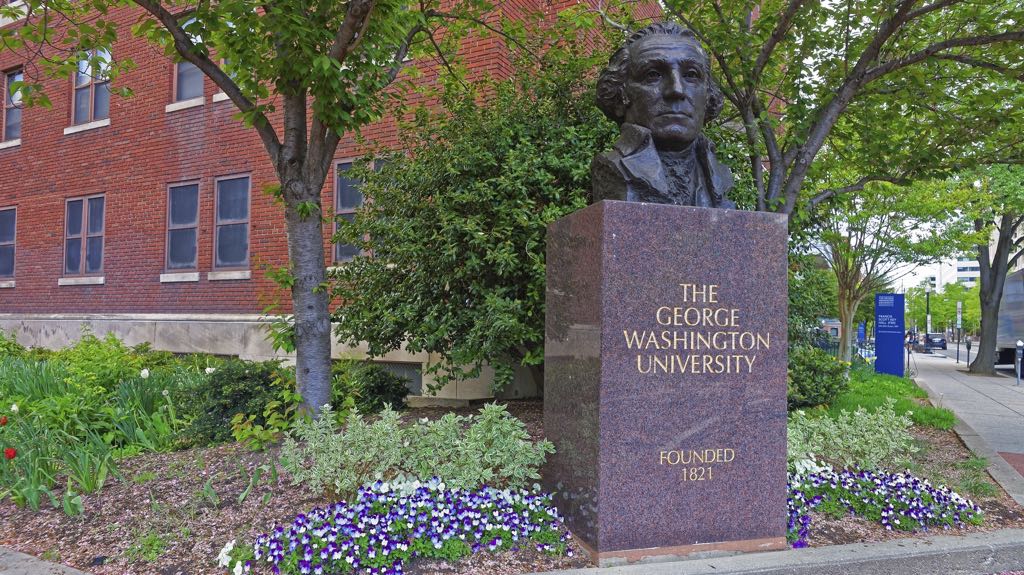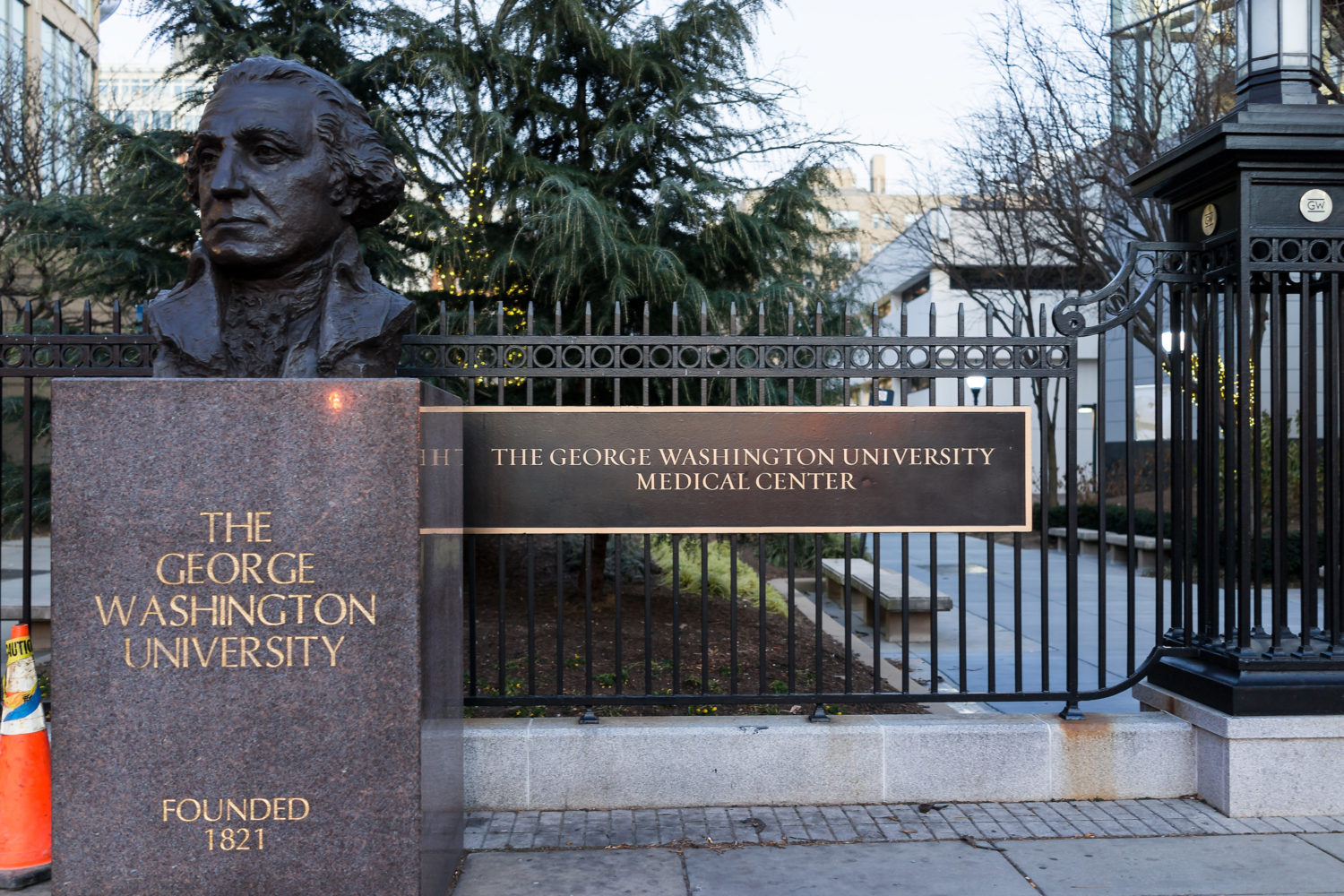“Do you remember that thing where all of the big brand Twitter accounts were just tweeting out one-word thematic statements?” asks Dylan Basescu. “Well, maybe this is me being petty and shitposting a little bit, but I just tweeted out ‘coup.’ ”
Basescu is a George Washington University law student with an immodest ambition: to oust the school’s student president, who he believes is in office illegitimately. Depending on who you ask, Basescu’s efforts are either “an anti-democratic removal attempt that would overrule the election results from a democratic body” (per GW student Andrew Harding) or a patriotic “stress test” of the health of GW’s democracy that might, in Basescu’s opinion, lead to much-needed reform.
Either way, it’s a warped microcosm of America’s political problems that’s currently playing out in “Student Court”—a body whose members wear literal robes. Their verdict, which will determine whether the current president stays in power, could be handed down later this month. Hearings begin on Friday evening. Here’s what you need to know.
First, Some Context
This whole debacle began back in June with the fall of Roe v. Wade—specifically, with that whopper of a concurring opinion that Justice Clarence Thomas wrote, the one that teased a rollback of marriage equality and limits to contraceptive access. In its wake, many GW students called for the university to fire Thomas as an adjunct law professor. The university refused.
Within the GW Student Association, members clashed about how to proceed. Some student leaders, like Basescu, wanted to fight back. Others—including Christian Zidouemba, the student body president—didn’t see the point, since the SA has no authority over Justice Thomas’s employment.
This dispute grew nasty, particularly over a petition opposing the administration’s stance. Some student leaders planned to sign with their official SA titles, but Zidouemba said no; he thought it might look like the SA was formally taking a position, which could strain relations with administrators. From Zidouemba’s perspective, his government was full of treacherous insubordinates bent on defying him, while his opponents claim he was acting like a power-crazed lunatic. (For what it’s worth, he caved on the titles in the end.)
Basescu, who was then a member of Zidouemba’s cabinet, says he feared the president was so bent-out-of-shape about the Clarence Thomas situation that he might “disrupt the functions of the government.” So on July 1, in a hastily planned Zoom meeting, Basescu and four other members of President Zidouemba’s cabinet voted to fire him.
To do so, they invoked Article 15 of the Student Association’s constitution, which is roughly analogous to the 25th Amendment of the United States Constitution; the idea is that when a president is unable to fulfill his duties, he can be removed. The cabinet’s claim was that Zidouemba was behaving so erratically—and creating such a hostile work environment in the process—that he was no longer capable of doing his job.
So, How Did President Zidouemba React?
Well, basically like this:
View this post on Instagram
Zidouemba heard the news of his firing while working the night shift at a local CVS. Standing in what appears to be a storeroom, he made a quick Instagram video stridently proclaiming that he was, in fact, still the president. A couple hours later, Zidouemba released a statement implying that Article 15 was meant to be invoked in the event of medical incapacitation, not political disagreement. Basically, he was calling this a coup.
For about 24 hours, student government descended into chaos: Zidouemba insisted he was still president, the student newspaper reported that he wasn’t, there were firings and resignations, tempers flared. But on July 2, two of the five cabinet members who voted for removal announced that they were reversing their votes. Most of the student body then accepted that President Zidouemba would remain in power. That seemed to be the end of it.
Enter, the Lawsuit
A couple weeks later, one of the ringleaders of the removal attempt filed a lawsuit in Student Court: Cordelia Scales, former chief of staff to President Zidouemba, asked the justices to declare his presidency illegitimate. Dylan Basescu is Scales’ “student court representative”—her lawyer, essentially, though it’s illegal to call yourself a lawyer if you aren’t one. The lawsuit contends that Zidouemba is not the president of the Student Association, since the cabinet legally removed him via Article 15.
But wait—didn’t that vote get withdrawn? “Reversing your vote is kind of an incoherent concept,” Basescu says. “Once a vote is completed, you can’t take it back. If someone said, ‘I voted for Joe Biden, but I really don’t like how the economy’s doing, so I’m actually switching my vote to Trump,’ we’d laugh at them. We’d say, ‘You live in America, you know that’s not how this works.’ ” And if vote-reversing is a sham, then the initial vote stands: Zioduemba was therefore removed.
Andrew Harding, who is the not-lawyer on Zidouemba’s side, counters that the initial vote wasn’t actually legal: the SA’s constitution says that in order to invoke Article 15, the president’s chief of staff must be there. But President Zidouemba had two chiefs of staff at the time: Cordelia Scales and Keanu Rowe. “Mr. Rowe was not informed about this whole secret meeting that was going on,” Harding says, “and it’s understandable why: he would have voted no, thus preventing this whole removal attempt from moving through.”
Harding’s contention is that both chiefs of staff needed to be present in order to satisfy the requirements of the SA constitution. So, if Student Court determines that only one chief of staff was required, then Zidouemba is out—but if both needed to be there, he stays.
An Added Wrinkle
Inside the court docket is an amicus brief filed by Aiza Saeed, Zidouemba’s then communications director. She initially voted to remove him, but now says her vote was coerced. Saeed writes that she Zoomed into the emergency cabinet meeting without knowing what it was about, and when she learned that they’d convened to fire the president, she yelled—while muted—“SHUT UP, they have to be joking.”
Saeed voted to remove, but she claims she had “no choice”—that Basescu and Scales said Zidouemba would fire her if she didn’t. The two other cabinet members on the call back her up: Vice President Yan Xu reversed his vote, and while treasurer Faheem Ahmad didn’t reverse his, he later testified before the Senate that he’d felt backed into a corner when he voted yes. “A coerced vote cannot be considered a valid vote,” Saeed writes in her Student Court brief, calling the meeting a “power grab.” Because of this, she believes that President Zidouemba was not legally removed.
But wait! At issue in the lawsuit is yet another bizarre technicality: On July 1, the cabinet voted for removal at 5:38 PM—but they did not notify the court and the Senate until 6:05. In the meantime, Zidouemba got wind of the vote and sent a 5:52 PM email terminating Basescu and Scales. If the 5:38 vote legally removed Zidouemba, then he no longer had the authority to fire cabinet members at 5:52. But if delivering the vote is what seals it, then Scales and Basescu were fired and therefore could not remove Zidouemba at 6:05. “Basically, it’s a who-fired-who, who-shot-first sort of situation,” Basescu says.
All this confusion raises a kind of bananas question: Who is the current president of the GW Student Association? If Zidouemba wasn’t legally removed, then he’s still the president. But if he was legally removed, then the president is—well, several senators asked this question in a meeting, and nobody really had an answer.
But, Why?
If Basescu and Scales sound like power-hungry trolls sowing chaos in student government, that’s actually a perception Basescu understands. Whenever the student paper publishes an article about this fiasco, he says, “the overwhelming response is, ‘Oh my god, go outside, talk to a girl, drink a beer, touch some grass.’ And, you know, in a sense that’s a fair response.”
But he insists there’s a bigger picture: He and Scales were legally entitled to their Article 15 vote, as well as to their lawsuit—they’ve simply followed the procedures laid out in the constitution. “If those rules are bad, then we should change them,” he says. “If following the rules results in absurdities like this, then it really makes you question whether this is a good system to have at all.”
So, sure, Basescu wants the suit to overthrow President Zidouemba—but he also hopes it leads to constitutional reform, preventing future power struggles like this one. “I think that’s a good public purpose of a lawsuit, to throw a wrench in things and show people that the rules they wrote down can actually result in things they don’t like,” he says. (Andrew Harding, for what it’s worth, finds the lawsuit to be “meaningless political theater” that distracts from the SA’s “collective ambitions of helping the student body succeed.”)
But reform now glimmers on the horizon: Back in July, following the coup-like activities of the cabinet, the SA formed a committee to revise its governing documents. (Ironically, this was the same day Justice Thomas pulled out of teaching at the law school—the SA drama has now outlasted its original source.) One student senator told a campus paper that the reform committee was meant “to prevent anyone in the SA from abusing their power” in the future, and another senator hopes amending the constitution will limit “misinterpretations” that might lead to “more unnecessary Student Court cases.”
Basescu takes these rebukes in stride. “You might call this a dadaist project, you might call this absurdism,” he says of the lawsuit. “Some people might call this trolling, they might say, ‘Oh, you’re trolling the student government.’ And to that I would say: My client and I are only doing what the procedures allow us to do. And if you don’t like that: Don’t hate the player, hate the game.”


















